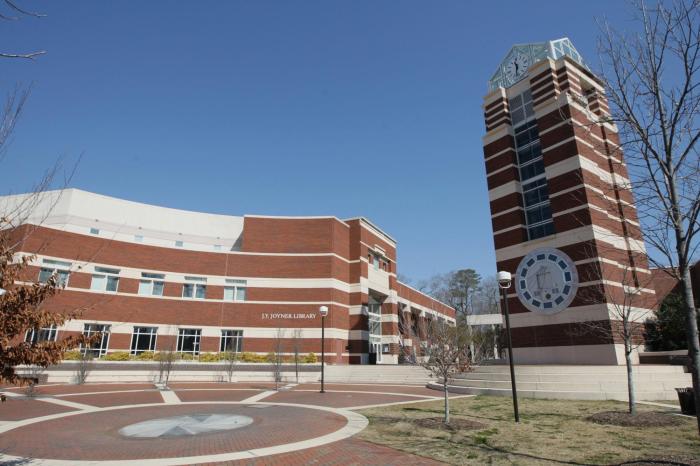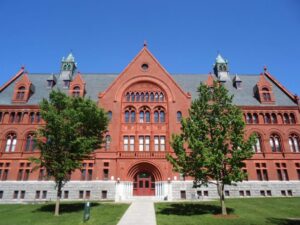Embark on a journey to Visit East Carolina University, where a thriving campus culture, academic excellence, and a commitment to community engagement converge to create an unforgettable student experience.
Nestled in the heart of Greenville, North Carolina, ECU boasts a diverse student body, renowned academic programs, state-of-the-art facilities, and a vibrant athletic scene that contribute to a dynamic and inclusive campus environment.
Campus Life and Student Experience

East Carolina University is a vibrant and diverse community where students can thrive both academically and personally. The campus culture is friendly and welcoming, with a strong sense of school spirit and community involvement.
Student life at ECU is rich and varied, with over 400 student clubs and organizations to choose from. These groups cover a wide range of interests, from academic honor societies to social clubs to sports teams. There are also plenty of opportunities for students to get involved in campus events, such as concerts, sporting events, and cultural festivals.
Academic Support
ECU provides a variety of academic support services to help students succeed in their studies. These services include tutoring, writing centers, and math labs. The university also offers a number of programs to help students transition to college, such as the First-Year Experience program and the Peer Mentor program.
Academic Programs and Research Opportunities
ECU offers a comprehensive range of academic programs at the undergraduate and graduate levels, catering to diverse interests and career aspirations. Our undergraduate programs encompass a wide spectrum of disciplines, including the arts, sciences, business, education, and health sciences. At the graduate level, we offer master’s and doctoral degrees in various fields, fostering advanced research and professional development.
Research Initiatives and Facilities
ECU is renowned for its robust research enterprise, supported by state-of-the-art facilities and dedicated faculty. Our research initiatives span a multitude of disciplines, addressing pressing societal challenges and advancing knowledge frontiers. The university houses specialized research centers and institutes, including the Brody School of Medicine’s Center for Health Disparities and the Coastal Studies Institute, which conducts groundbreaking research on coastal ecosystems and environmental sustainability.
Notable Research Projects and Impact
ECU faculty and students are engaged in cutting-edge research projects that have a tangible impact on the community and beyond. For instance, our researchers are developing innovative therapies for cancer and Alzheimer’s disease, exploring renewable energy sources, and studying the effects of climate change on coastal communities. These research endeavors not only contribute to scientific advancement but also provide practical solutions to real-world problems, improving the lives of people in our region and beyond.
Athletics and Recreation: Visit East Carolina University

ECU boasts a vibrant athletic program, fielding teams in various NCAA Division I sports. The Pirates compete in the American Athletic Conference, showcasing their prowess on a national stage. With a dedicated fan base, ECU’s athletic events electrify the campus and community, fostering a sense of pride and camaraderie.
The university’s athletic facilities are state-of-the-art, providing student-athletes with exceptional training and competition environments. The Dowdy-Ficklen Stadium, home to the ECU Pirates football team, offers a thrilling game-day experience with a capacity of over 50,000. Minges Coliseum serves as the home court for the men’s and women’s basketball teams, accommodating over 8,000 spectators.
Beyond competitive athletics, ECU offers a wide range of recreational opportunities for students to stay active and engaged. Intramural sports leagues allow students to participate in various team and individual sports, promoting camaraderie and friendly competition. Fitness centers located throughout campus provide access to modern equipment and group fitness classes. Outdoor enthusiasts can explore the scenic campus trails or engage in activities at the ECU Outdoor Education Center, fostering a healthy and active lifestyle.
Community Engagement and Partnerships
ECU is deeply committed to fostering meaningful connections with the community. Our engagement initiatives prioritize outreach programs that address local needs and enhance the social, cultural, and economic fabric of the region.
Partnerships for Impact, Visit East Carolina University
ECU collaborates with numerous local organizations and businesses to amplify our community impact. These partnerships facilitate internships, research opportunities, and service-learning projects that provide students with hands-on experience while contributing to the betterment of the community.
Community Development Initiatives
Through our community engagement initiatives, ECU plays an active role in addressing critical social issues and fostering economic development. We offer programs that promote health and wellness, support educational attainment, and empower local businesses.
Examples of ECU’s Community Contributions
– ECU’s Brody School of Medicine provides free health screenings and educational programs to underserved communities.
– The College of Education partners with local schools to enhance teaching practices and improve student outcomes.
– The Miller School of Entrepreneurship offers mentorship and training programs to support aspiring entrepreneurs in the region.
Historical Significance and Campus Architecture
East Carolina University (ECU) has a rich history that dates back to 1907 when it was founded as a teacher training school. Over the years, the university has grown and evolved into a comprehensive institution offering a wide range of undergraduate and graduate programs. ECU’s campus is a beautiful and historic place, with a mix of architectural styles that reflect the university’s long history.
The university’s main campus is located in Greenville, North Carolina, and is home to a variety of academic buildings, residence halls, and athletic facilities. The campus is also home to several historic buildings, including the Old Main Building, which was built in 1909 and is the oldest building on campus. Other historic buildings on campus include the Wright Building, which was built in 1923 and is home to the College of Education, and the Mendenhall Building, which was built in 1929 and is home to the College of Business.
ECU’s campus is a beautiful and historic place that reflects the university’s long and proud history. The mix of architectural styles on campus creates a unique sense of place that is both welcoming and inspiring.
End of Discussion
As you delve deeper into the world of ECU, you will discover a university that values academic rigor, fosters personal growth, and inspires a lifelong pursuit of knowledge and service.
ECU’s unwavering commitment to community engagement ensures that its impact extends far beyond the classroom, making it an integral part of the social, cultural, and economic fabric of eastern North Carolina.
FAQ Compilation
What is ECU’s campus culture like?
ECU’s campus culture is vibrant and inclusive, with a diverse student body representing over 100 countries. The university offers a wide range of clubs, organizations, and social events that cater to a variety of interests and backgrounds.
What are the academic programs like at ECU?
ECU offers a comprehensive range of undergraduate and graduate programs, including nationally recognized programs in nursing, business, and education. The university also boasts a strong research enterprise, with faculty engaged in cutting-edge research that impacts the community and beyond.
What are the athletic and recreational opportunities at ECU?
ECU is home to a Division I athletic program, with teams competing in the American Athletic Conference. The university also offers a variety of intramural sports, fitness centers, and outdoor recreation opportunities for students to stay active and engaged.
How is ECU involved in the community?
ECU is deeply committed to community engagement and outreach. The university partners with local organizations and businesses to provide service-learning opportunities for students, support economic development, and enhance the quality of life in the region.
What is the historical significance of ECU?
ECU was founded in 1907 as a teacher training school. Over the years, the university has grown and evolved into a comprehensive institution, playing a vital role in the social, cultural, and economic development of eastern North Carolina.




